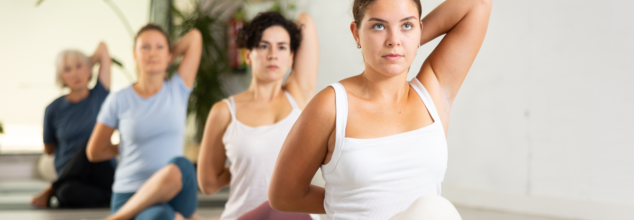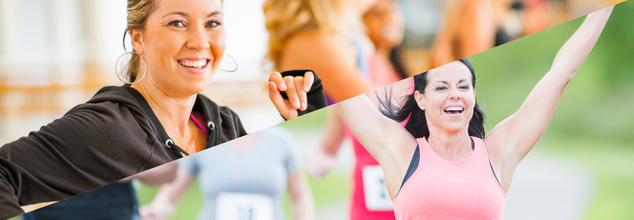- Health Conditions A-Z
- Health & Wellness
- Nutrition
- Fitness
- Health News
- Ayurveda
- Videos
- Medicine A-Z
- Parenting
- Web Stories
Practice This Yoga Pose For Enhanced Flexibility And Mobility

Yoga is a great way to start your day. When you exercise before you begin your day-to-day activities, you may notice how you feel rather refreshed and energized. Yoga has many stretches and poses that can help you strengthen your body along with keeping your muscles revitalized. One such yoga pose is Gomukhasana.
Gomukhasana, or Cow Face Pose in yoga, is a sitting pose. It is a pose that allows one to stretch deeply as well as test one’s endurance. When you translate it from Sanskrit, the name comes from "go" (cow) and "mukha" (face) because the final stage of the pose takes the shape of a cow's face. In the pose, your arms are positioned so one looks like the cow's mouth and the other like its ear. Gomukhasana helps make your shoulders, chest, and hips more flexible, while also improving your body's alignment and helping you relax. It's often part of yoga to boost your body and mind.
How Does It Benefit Your Body?
Eases Sciatica Pain
This yoga pose can help lessen the pain you might feel if you have sciatica, which is nerve pain in your lower back and legs. Doing it regularly might take some pressure off that nerve and make you feel better.
Good for High Blood Pressure
Cow Face Pose could be helpful if you're trying to manage high blood pressure naturally. It can help your body relax and get your blood flowing better, which might lead to healthier blood pressure numbers.
Helps Reproductive Health
Doing this pose regularly can gently work on and massage the organs in your body related to having children. This can be good for their overall health and how they function.
Fixes Stiff Shoulders and Posture
If your shoulders feel tight or you tend to slouch, Gomukhasana can really help. It stretches your shoulders and makes your spine longer, which can improve how you stand and sit over time.
Makes Hips More Flexible
This pose is great for making your hips move more easily. The way you position your legs gives a deep stretch to the outside of your hips and upper legs, helping them become more bendy.
Reduces Stress and Worry
Besides making your body feel good, Cow Face Pose can also calm your mind. Holding the pose and focusing on your breathing can help you feel less stressed and worried, bringing a sense of peace.
Step-By-Step Guide On How To Do It
- Start sitting in Dandasana (Staff Pose), with your legs straight out in front of you.
- Bend your right knee and bring your left foot to the outside of your right hip, tucking it under your right knee. At the same time, put your right foot on the outside of your left hip, lining up your right knee over your left knee.
- Sit up tall, feeling your sitting bones on the floor. Breathe in and make your spine long, stretching your arms out to the sides with your palms facing forward.
- Turn your right shoulder inwards, so your palm faces the wall behind you and your thumb points down. Move your right arm behind your back, bringing your hand up between your shoulder blades with your palm facing out.
- Reach your left arm straight up towards the ceiling, with your palm facing forward. Bend your left elbow and reach down to try and touch your right fingertips, maybe even holding fingers if you can.
- Your right knee should now be on top, and your left elbow pointing up.
- Gently squeeze your shoulder blades together on your back to open your chest. Hold this pose for a few breaths.
4 Exercises That Boost Your Sleep Health - Study Shows How Much You Should Do

Many people struggle with insomnia, which means having a hard time falling or staying asleep, or waking up too early and not being able to go back to sleep. While there are medications and therapies, they can have side effects or be difficult to access. This has led scientists to look into simpler, more natural ways to help.
Many people who have insomnia or other sleeping issues find it much easier to tire themselves out before they go to bed. Whether it is with things like housework, errands, or going out to exercise. A big aspect of good sleep happens to be fitness. Being fit not only helps you keep healthy and your body functions regularly, but it also helps people fix issues like lack of sleep.
Exercise As Aid
The study was done in the Beijing University of Chinese Medicine and it delved into the potential of exercise-based methods to combat insomnia. They analyzed data from 22 clinical trials involving 1,348 patients and 13 different sleep-boosting measures. The study focused on seven types of exercise:
- Yoga
- Tai Chi
- Walking or Jogging
- Aerobic plus Strength Exercise
- Strength Training Alone
- Aerobic Exercise Combined with Therapy
- Mixed Aerobic Exercises
Best Exercises for Sleep
The study found some really positive things:
- Yoga was a big winner. It helped people sleep almost two hours longer and cut down the time they spent awake after first falling asleep by nearly an hour.
- Walking or jogging made insomnia symptoms less severe overall. It also seemed to lower cortisol, which is a stress hormone, and boost melatonin, the hormone that helps control your sleep cycle.
- Tai Chi improved the quality of sleep.
The researchers concluded that exercise is an effective way to improve sleep for people with insomnia. They specifically mentioned that yoga, Tai Chi, and walking or jogging were more effective than other exercises.
Why These Exercises Work
Scientists think these exercises help with sleep in a few ways:
Yoga makes you more aware of your body and teaches you controlled breathing. This can help ease anxiety and depression, which often make it hard to sleep.
Tai Chi involves slow, gentle movements and focuses on breathing control and relaxing your body. This can help you manage your emotions better, which is good for sleep.
Walking or jogging can improve sleep by burning energy, lowering stress hormones like cortisol, helping with emotional balance, increasing melatonin (the sleep hormone), and even boosting the amount of deep sleep you get.
How Much Exercise Is Enough?
The studies showed that people usually kept up with the exercise for four to 26 weeks before their sleep benefits were measured. However, the studies didn't say exactly how many times a week they exercised. For yoga, beginners are usually told to do two to three sessions per week, and doing it regularly is important to see improvements.
The researchers believe that exercise can be a powerful treatment for insomnia. They even suggested that exercise programs could be part of regular doctor visits and community health programs. Doctors can already suggest exercising as part of a treatment plan, and many places have programs where doctors can send patients to local fitness centers.
Exercising At This Time Of The Day Not Only Helps Your Heart, But Also Strengthens Your Lungs

Exercising is a crucial part of keeping ourselves healthy. Whether it is walking, going to the gym or even working out at the weekends, it is very important for your body. Everybody has their own preferences regarding exercising, while some people find it much better to exercise early, others go for evening exercises.
Research published in the Medicine & Science in Sports & Exercise journal suggests that exercising in the morning could be especially good for the heart and lungs of older adults. The study also found that simply having a regular exercise routine can bring health benefits. Experts explained that getting physical activity earlier, consistently, and more often during the day might help you stay fit as you get older.
What the Study Revealed
To understand how the time we exercise affects our overall fitness and health, scientists looked at health information from 799 older adults (average age 76). Participants wore devices on their wrists for seven days to track their activity. They also underwent tests to check their heart and lung health and had regular doctor visits. Here's what researchers discovered:
- Being most active in the morning (what they called "peak morning activity") was linked to better heart and lung fitness and more efficient walking (meaning the body uses energy better while walking).
- Exercising at the same time each day consistently was connected to better health outcomes.
- People who had regular patterns of rest and activity throughout the day showed better heart and lung fitness and walking efficiency.
Why Exercise Timing Might Matter
There's still a lot to learn about how the timing of our physical activity affects our health and the risk of long-term diseases. More research is definitely needed to fully understand this link.
However, researchers suggested that the connection between exercise and our body's natural circadian clock (our 24-hour internal rhythm) might explain why timing matters. This internal clock controls things like body temperature and hormone release. So, the time of day you're most active could actually impact how well you perform and even how your muscles respond at a very basic level. Depending on the timing, working out could also either shift your internal clock or keep it steady, which seems to help muscle cell function and overall metabolic health.
Lastly, it's worth noting that everyone has a chronotype – whether you naturally feel more awake in the morning, afternoon, or evening. Scientists believe that knowing your chronotype and planning your activities accordingly could significantly impact your health and fitness.
Should You Exercise in the Morning?
The American Heart Association suggests getting 150 minutes of moderate exercise or 75 minutes of vigorous activity per week. But a growing amount of evidence suggests that even short bursts of movement – even just 20 minutes a week – can significantly benefit your heart.
One sports medicine doctor emphasized that any amount of exercise makes a difference and that whether you exercise is more important than when. Another expert agreed, highlighting that having a consistent exercise schedule is also very important. Both the new study and other research show that sticking to a routine offers many benefits, from preventing long-term diseases to improving survival rates with cancer.
Science Shows What Exercise You Should Do According To Your Personality

Many times, the things we like to do aren’t easy to do. While it may suit other people, there is no guarantee that it is the best for you. So how does one go about looking for the exercises that suit us? How about picking exercises according to your personality?
A recent study published in the Frontiers in Psychology journal suggests that picking your exercise according to the kind of personality you have could be the best idea. The study suggests that if your workout fits your personality, you're more likely to stick with it and see better results.
Researchers mentioned that our personality affects how we respond to and engage with exercise. Think of it from a different perspective, like a person who enjoys talking and having conversations with people, they fair better in jobs that allow more face-to-face interactions. Similarly, this study explains that some aspects of our personality could help us find better results with a certain type of exercise. Understanding ourselves and others can help create personalized fitness plans that lead to lasting changes in how active we are.
How Your Personality Shapes Your Workout Choices
Researchers wanted to make physical activity more enjoyable for people. So, they explored how personality affects what kind of exercise people prefer and how committed they are. They studied 86 individuals over eight weeks. First, participants filled out surveys about their stress levels and personality traits, like how friendly or anxious they tend to be. Then, they underwent fitness tests and were divided into two groups:
- A "resting" group that continued their usual daily activities and did some light stretching each week.
- Another group that performed cycling and strength training at home.
Throughout the study, participants regularly reported how much they enjoyed their exercise sessions.
Finding the Best Workout for Your Personality
The study didn't pinpoint exact exercises for specific personality types, but it did reveal some general patterns connecting what are called the "Big 5" personality traits with workout preferences:
- Extroverts often enjoy intense workouts with other people, like team sports.
- Anxious individuals tend to prefer private workouts with breaks built in.
- Conscientious people generally fit in more physical activity each week and show better overall fitness.
- Agreeable people like to exercise for a while but prefer activities that are less intense.
- Open-minded individuals are willing to try different workouts, but they might rate very strenuous or high-intensity exercises lower than other groups.
It makes a lot of sense that your personality strongly affects your workout preferences. Your traits influence your willingness to try new things, how you feel about effort, and your comfort in different environments, making exercise a natural way for these tendencies to show up.
Experts note that this study was stronger because it used objective measurements rather than just relying on what people reported about themselves, which is common in similar research.
However, the study wasn't perfect. More than 70% of participants were described as open-minded, conscientious, and emotionally stable, meaning the group might not fully represent everyone in the general population. Plus, the study didn't account for participants' past exercise experience or why they chose particular workouts.
Your Fitness Journey, Your Choices
Tailoring your fitness program to your personality could potentially boost your exercise gains and overall health. Finding workouts that people will actually do and stick with is crucial for consistent physical activity.
If you're thinking about trying a new workout, experts suggest reflecting on your own personality traits and the types of activities you usually gravitate toward. It's helpful to pay attention to how you feel after different types of sessions, whether it's a strength workout, yoga, or a run. Ask yourself if it energizes you, calms you down, or just makes you too tired for anything else.
However, it's also important to think about other factors that might help you stick with an exercise routine, such as how easy it is to access, any injuries you might have, and your specific fitness goals.
Being willing to adapt and create a plan that truly works for you will help you achieve more long-term benefits. Setting clear goals that include measurable progress is an excellent way to build towards success.
© 2024 Bennett, Coleman & Company Limited

